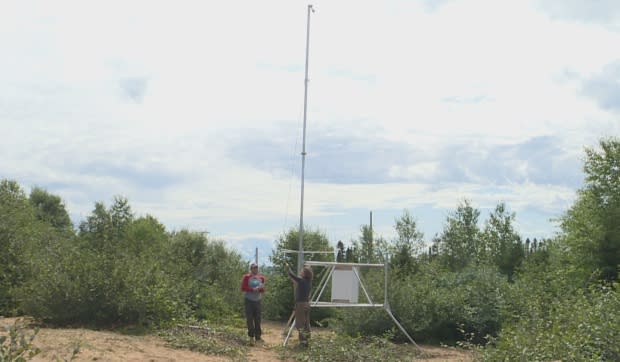Labrador coast residents to get much-needed weather stations, built by researchers

Living in Labrador means working with Mother Nature, not against her.
Many communities across the Big Land don't have their own weather station, and knowing the weather is a matter of survival in some cases.
That's why a team led by Queen's University has been travelling along the Labrador coast this summer installing small weather stations.
The stations operate via satellite to help smaller communities receive localized weather information, rather than relying on a forecast from areas nearby.
The latest one has been installed in North West River as part of the Coastal Labrador Climate and Weather Monitoring Program. Others included Black Tickle, Rigolet, Postville and Red Bay.
"They try and use a mathematical model in conjunction with where they have weather stations to predict what its like at a place. So, in the case of Black Tickle they're using information from maybe Mary's Harbour and also Cartwright to try and guess what its like in Black Tickle," said Robert Way, a Labradorian and an assistant professor at Queen's University.
"A station like this provides a means for residents in that community to actually look up what the actual weather is, and not just what's being forecasted."
The program is funded by the Government of Canada, with collaboration with the government of Newfoundland and Labrador through the Department of Municipal Affairs and Environment.

The team from Queen's University held consultations with the communities it is building in before constructing any weather stations.
Once given the green light, it was understood that localized weather stations were desired by more than just one community.
Transportation and infrastructure important
Labrador is a massive geographic area that relies on weather for much of its transportation of people, groceries, medical evacuations and more through land, sea and air.
Winter months can be unforgiving.
"In an area like Labrador where people go long distances on snowmobile and boat, having a good idea about wind speed in particular, and wind direction, matters quite a lot," Way said.
However, Way added that localized weather stations shouldn't be left for university researchers to install.
He said weather stations are a part of important infrastructure in which government should already have in place, and that it has been a large oversight for government to not have something in place in older Labrador communities by now.
"This type of stuff should have been done beforehand. So, at the same time that we are investing huge amounts of money in some climate change infrastructure in some regions, it's important to remember that things as simple as setting up weather stations really matter to people on the ground," Way said.
Read more articles from CBC Newfoundland and Labrador


